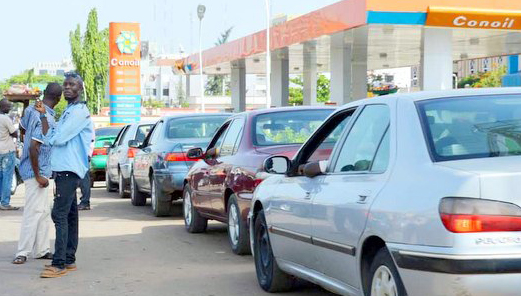Business
No respite for Nigerians as petrol scarcity bites harder — Business — The Guardian Nigeria News – Nigeria and World News

. Long queues at stations as price soars above N1000/litre at black market
. Operators lament lack of forex to run businesses, mismanagement of subsidy removal
The scarcity of Premium Motor Spirit (PMS), popular known as petrol, which again, resurfaced in some parts of the country, noticeably Abuja and Lagos, yesterday, may have further compounded the woes of Nigerians, who are currently battling lack of healthy diet due to rising inflation, forex challenges to do business, poor electricity supply amidst rising insecurity across Nigeria.
Indeed, yesterday in Abuja, Lagos, Benin, Osogbo, Ibadan and other cities, as monitored by The Guardian, the situation is fast becoming worse amidst the current administration’s poorly planned subsidy removal as most fuel stations were shut.
Fuel stations that managed to open were greeted with long queues in some of the cities. Black marketers dispensed fuel for as much as N1000 per litre, largely in the Federal Capital Territory.
This current scarcity is coming after a series of outcry by fuel marketers, who had insisted that fuel subsidy had returned on PMS as the government uses the NNPCL to manage and monopolise the market.
At the headquarters of NNPC in the Central Area of Abuja, black marketers were dispensing at about N1000 per litre, while a few private outlets sold for N649 per litre. At that, it will take at least 30 minutes before patient motorists can access the pump.
The queues at NNPC Retail stations take about an hour as motorists jostled to buy the product at N614 per litre.
Petrol marketers had raised concerns about the downturn of deregulation of the downstream sector on the country’s oil and gas industry, insisting there is a need for the Federal Government to make foreign exchange available at a subsidised rate.
The marketers admitted that the current pump price of PMS does not reflect market realities, adding that the NNPCL maintained a dominant role due to lack of forex, which marketers are unable to access at the I & E window.
With the high price of diesel, the National Association of Road Transport Owners (NARTO) at a meeting, also demanded for an increase in freight as the haulage firms noted that the state of roads in the country has gone from bad to worse.
The marketers have also asked the government to end dollarisation of local activities, especially by the Nigerian Maritime Administration and Safety Agency (NIMASA) and the Nigerian Ports Authority (NPA).
In Lagos, most stations were shut, while motorists remained on queue for the major productive hours of their days even as fuel stations increased the pump price to N620 per litre.
NNPCL retail outlets at Falomo, Ikoyi and Ikeja in Lagos were shut while the one at Okota sold at N605. Jezco petrol station on Okota road sold for N615 while Majok fuel station dispensed at N618.
Some fuel stations in Osogbo, Osun State sold at the rate of N615, N620, while Bovas in Osogbo sold at the rate of N590.
The Guardian learnt that the situation was better in some parts of Oyo, Osun and in Ogun State as fuel stations sold at the rate of N585.
Speaking with The Guardian, a motorist, Azeez Akanni, decried how the scarcity has affected his business due to time wasting and loss of income.
“Passengers think we are being cruel, yesterday, where we normally charge N200 was N400 because of the time wasted at the fuel station and I had to buy black market which, was sold for N650 per litre.” he said
He charged the government to find a lasting solution to the crisis as he suggested the return of subsidy on PMS.
To a motorcycle rider, Aliyu Ahmed, who expressed anger and frustration, said he was yet to meet his income target as he wasted almost all day at the fuel station.
“I am tired, it’s as if I’m giving a free ride to people because it’s what they pay me to use in buying fuel. I bought N620 when I didn’t even have N1000 yet, ” he said.
A resident and business woman, Adeola Adeoye told The Guardian that the situation has left many Nigerians in great discomfort as they struggle to meet their daily needs.
She added that business has not been booming, with the hope that it won’t come to a halt, as she needs the fuel for her business being a frozen foods trader.
“Electricity is not reliable; the only thing that keeps my business moving is by fueling the generator to ice my goods but with the scarcity, I’m scared, the government should find a solution to it or return us back to the subsidy era, that time was convenient for us,” she said.
Emmanuel Chukwujekwu, a resident of Oke-Afa, Isolo, Lagos, told The Guardian that scarcity returned immediately as the dollar-to-naira climbed to N1100.
Chukwujekwu expressed his dissatisfaction over the scarcity, noting that the best solution is for Nigeria to have a working refinery.
He charged the government to ensure the refineries in the country are working to ease the burden and cushion the effect of FX rate on fuel on Nigerians.
Disclaimer: No copyright infringement intended. All rights and credits reserved to respective owner(s).
























